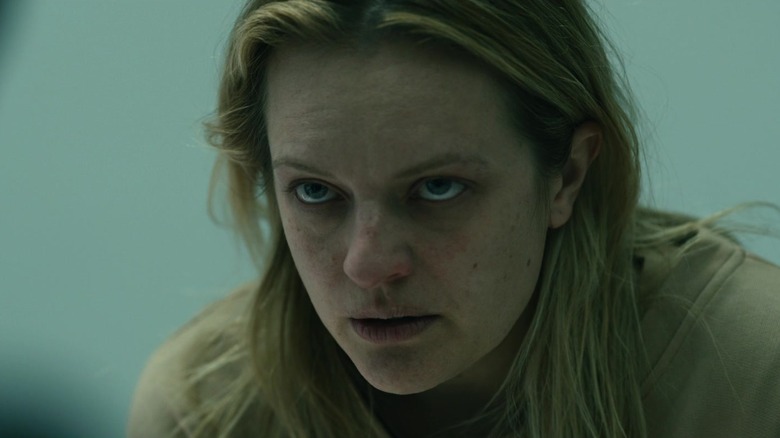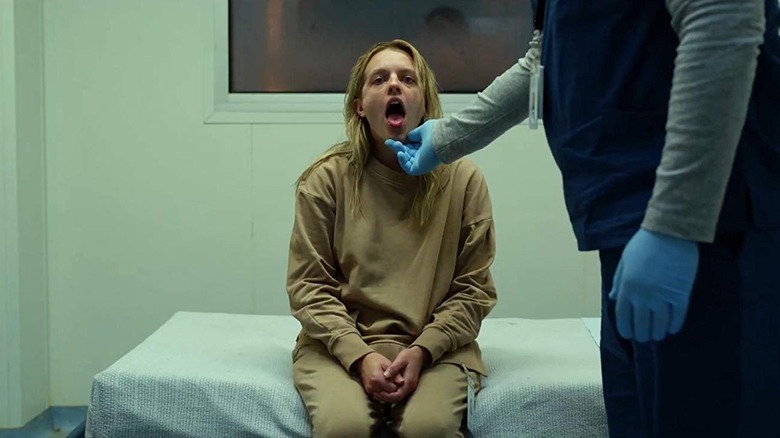The Invisible Man Review: See It If You Can
It's the middle of the night, but Cecilia Kass (Elizabeth Moss) isn't asleep. She's planning her escape. She's already drugged her soon-to-be-ex, Adrian Griffin (Oliver Jackson-Cohen), and is busily packing a bag, hoping to escape his high-tech mansion before the wealthy inventor wakes up.
Now, we've never met these people before. As Cecilia flees, there is no dialogue. There are no monsters. The threat of violence is only implied. For the most part, it's just a woman stumbling around in the dark. And yet, thanks to Moss' urgent performance and director Leigh Whannell's clever staging, it's a remarkably harrowing sequence. It's not about what's happening onscreen. It's about what could happen, and it's terrifying.
And that's just the opening scene. The Invisible Man is more stylish and much more clever than your run-of-the-mill horror movie, but ultimately its biggest strength lies in its ability to create tension out of nothing. Sure, there are a few jump scares and plenty of blood in Whannell's reimagining of H. G. Wells' sci-fi novel, but in The Invisible Man, empty rooms and skeptical glances are much more effective than the traditional horror movie moments. You might've seen an Invisible Man movie before, but you've never seen one quite like this.
The Invisible Man's main plot picks up a couple of weeks later, when Cecilia, still traumatized from Adrian's abuse, receives some welcome news. Adrian is dead, having committed suicide after Cecilia left him. A $5 million chunk of his fortune is now Cecilia's, to be paid in monthly $100,000 installments, assuming that Cecilia remains mentally fit and out of prison.
Of course, it's not quite that simple. Before long, Cecilia realizes that not only is Adrian still alive, but he's somehow managed to make himself invisible. Soon, Adrian is ruining her life. While his torments start small — a set of blankets that go missing while Cecilia sleeps, for example, or a mysterious email sent from Cecilia's laptop to her long-suffering sister — but they ramp up quickly. Unfortunately, Cecilia is the only one who knows the truth.
The Invisible Man embraces its premise wholeheartedly. The movie never questions Cecilia's sanity. It never flirts with the idea that it's all in her mind. Both Cecilia and the audience are sure that Adrian is alive and causing trouble. The scary part isn't whether or not all of this is really happening. It's that Cecilia knows exactly what's happening, and yet no one will believe her.
A performance to be reckoned with
That is, of course, a real fear for many women who have been abused or sexually assaulted, and The Invisible Man isn't subtle about its underlying message. Despite the setup, it's still a realistic portrait of an abusive relationship. Adrian methodically isolates Cecilia from her friends and family. He makes her doubt her own perceptions, Gaslight-style. He slowly takes control of Cecilia's life and ultimately ends up dictating her every move. Even though Cecilia technically escaped Adrian's house, he's never been more than control. It's all textbook for abuse cases, and while there's an element of sci-fi to the proceedings, the real violence is all too realistic.
It's a clever use of the invisible man premise, but it asks a lot of Moss. The Handmaid's Tale and Mad Men star appears in almost every scene in the movie. Often, she's the only person on the screen, reacting to things that neither she nor the audience can see. Adrian is a presence but isn't really a character, and so it's up to Moss to both make Cecilia feel real and bring Adrian's menace to life.
To say that she succeeds would be an understatement. Moss doesn't even need dialogue to express Cecilia's pain, terror, anger, and, ultimately, her steely resolve. Whether she's sneaking out of Adrian's mansion at midnight or trying to convince the police that she's not actually crazy, it's all there on Moss' face. It's enough to develop two characters at once. Because of Moss, we believe that the unseen Adrian is a real threat. Because of her, we believe that Cecilia is one of the only people on the planet stubborn enough to stand up to him.
Enough atmosphere and action to smooth over any flaws
Moss has an assist, of course, in Whannell's canny direction. The Invisible Man spends a lot of time on mostly-empty sets, and Whannel often lets the camera linger on open spaces, hinting at the possible dangers they contain. More overt shocks are used sparingly. They're enough to make the stakes feel real, but never overwhelm the story or the underlying message.
Not until the surprisingly action-packed climax, anyway. Inevitably, things get out of hand, and The Invisible Man's final act resembles a slasher flick more than a taut, psychological thriller. Remarkably, the movie doesn't suffer for it.
In part, that's because Whannell effectively shows just how scary and effective invisibility powers would be in a real-life fight, but again Moss deserves most of the credit. She does such a good job of making Cecilia into a flawed but extremely likable character, and the abuse she suffers feels so real despite the sci-fi trappings, that the mere suggestion that Adrian might emerge victorious is maddening.
The Invisible Man isn't perfect. Aldis Hodge, who plays Cecilia's friend James, and Storm Reid, who plays James' daughter, turn in solid and charismatic performances, but the characters are more interesting in terms of how they relate to Cecilia than as stand-alone personalities. Same goes for Harriet Dyer as Cecilia's sister, who isn't quite as sympathetic to Cecilia's plight as she should be.
The movie glosses over a few details to keep its story going, too. The money that motivates a lot of the early action doesn't play much of a part in the second half. Exactly how Adrian faked his death isn't explained, which stands out given that the man is supposedly a world-famous tech guru.
Those are minor complaints, though. As a look inside an abusive relationship, The Invisible Man is a haunting and almost unbearably tense. It's an excellent showcase for Whannell, and it has what's arguably Moss' best-ever performance (and, given her resume, that's saying a lot). In fact, it doesn't seem like much of a stretch to call The Invisible Man the first great horror movie of the new decade. Make sure you see this one — that is, if you can.


